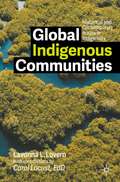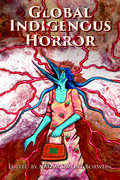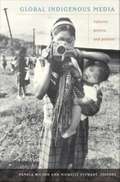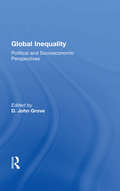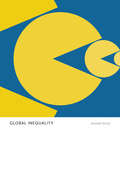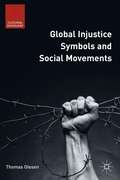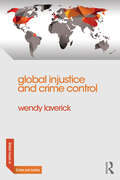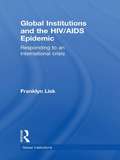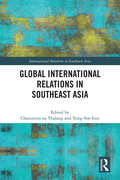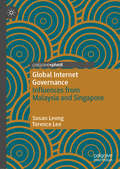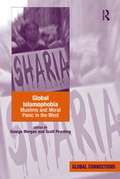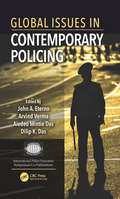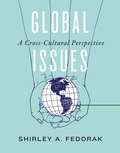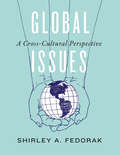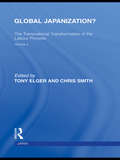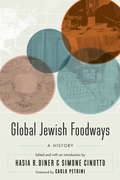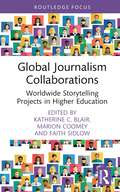- Table View
- List View
Global Indigenous Communities: Historical and Contemporary Issues in Indigeneity
by Lavonna L. LovernGlobal Indigenous Communities is a wide-ranging examination of global Indigenous communities that continue to suffer from colonization and assimilation issues, including intergenerational trauma. The scholarship is interdisciplinary; it is not easily categorized as sociology, anthropology, ethnography, or philosophy, but cuts across all of these disciplines, as well as Indigenous methodologies. The book not only presents an academic study of Indigenous issues, covering Indigenous community life, religion, the environment, economic matters, education, and healthcare, but also incorporates contributions from Carol Locust, EdD, that reflect on her lifetime of experience in Indigenous education and healthcare. Each studied prism of Indigenous life is revealed to be impacted by the experience of intergenerational trauma that results from continued colonization. Ultimately, this book aims to bridge the communication gap between Western and Indigenous scholarship and readership, artfully combining Indigenous approaches with a traditional academic style.
Global Indigenous Horror (Horror and Monstrosity Studies Series)
by Naomi Simone BorweinContributions by Katrin Althans, Jayson Althofer, Naomi Simone Borwein, Persephone Braham, Krista Collier-Jarvis, Shane Hawk, Jade Jenkinson, June Scudeler, and Sabrina ZachariasGlobal Indigenous Horror is a collection of essays that positions Indigenous Horror as more than just a genre, but as a narrative space where the spectral and social converge, where the uncanny becomes a critique, and the monstrous mirrors the human. While contentions swirl around the genre category, this exploratory anthology is the first critical edited collection dedicated solely to ways of theorizing and analyzing Indigenous Horror literature. The essays, curated by scholar Naomi Simone Borwein, ask readers to consider what Global Indigenous Horror is—and to whom. The volume opens with a preface by international bestselling horror writer Shane Hawk (enrolled Cheyenne-Arapaho, Hidatsa, and Potawatomi descent), followed by an overview of Global Indigenous Horror trends, aesthetics, and approaches. The carefully selected contributions explore Indigenous Horror literature and mixed-media narratives worldwide, unraveling the intricate dynamics between the local and global, traditional and contemporary, and human and monstrous. Contributor chapters are grouped not by geographical or cultural variation, but along a spectrum, from a strong emphasis on ways of knowing to a critical inspection of Horror through Indigenous Gothic aesthetics across cultural boundaries and against and beyond nation states.
Global Indigenous Media: Cultures, Poetics, and Politics
by Pamela Wilson Michelle StewartIn this exciting interdisciplinary collection, scholars, activists, and media producers explore the emergence of Indigenous media: forms of media expression conceptualized, produced, and created by Indigenous peoples around the globe. Whether discussing Maori cinema in New Zealand or activist community radio in Colombia, the contributors describe how native peoples use both traditional and new media to combat discrimination, advocate for resources and rights, and preserve their cultures, languages, and aesthetic traditions. By representing themselves in a variety of media, Indigenous peoples are also challenging misleading mainstream and official state narratives, forging international solidarity movements, and bringing human rights violations to international attention. Global Indigenous Media addresses Indigenous self-representation across many media forms, including feature film, documentary, animation, video art, television and radio, the Internet, digital archiving, and journalism. The volume's sixteen essays reflect the dynamism of Indigenous media-making around the world. One contributor examines animated films for children produced by Indigenous-owned companies in the United States and Canada. Another explains how Indigenous media producers in Burma (Myanmar) work with NGOs and outsiders against the country's brutal regime. Still another considers how the Ticuna Indians of Brazil are positioning themselves in relation to the international community as they collaborate in creating a CD-ROM about Ticuna knowledge and rituals. In the volume's closing essay, Faye Ginsburg points out some of the problematic assumptions about globalization, media, and culture underlying the term "digital age" and claims that the age has arrived. Together the essays reveal the crucial role of Indigenous media in contemporary media at every level: local, regional, national, and international. Contributors: Lisa Brooten, Kathleen Buddle, Cache Collective, Michael Christie, Amalia Crdova, Galina Diatchkova, Priscila Faulhaber, Louis Forline, Jennifer Gauthier, Faye Ginsburg, Alexandra Halkin, Joanna Hearne, Ruth McElroy, Mario A. Murillo, Sari Pietikinen, Juan Francisco Salazar, Laurel Smith, Michelle Stewart, Pamela Wilson
Global Indios: The Indigenous Struggle for Justice in Sixteenth-Century Spain
by Nancy E. van DeusenIn the sixteenth century hundreds of thousands of indios--indigenous peoples from the territories of the Spanish empire--were enslaved and relocated throughout the Iberian world. Although various laws and decrees outlawed indio enslavement, several loopholes allowed the practice to continue. In Global Indios Nancy E. van Deusen documents the more than one hundred lawsuits between 1530 and 1585 that indio slaves living in Castile brought to the Spanish courts to secure their freedom. Because plaintiffs had to prove their indio-ness in a Spanish imperial context, these lawsuits reveal the difficulties of determining who was an indio and who was not--especially since it was an all-encompassing construct connoting subservience and political personhood and at times could refer to people from Mexico, Peru, or South or East Asia. Van Deusen demonstrates that the categories of free and slave were often not easily defined, and she forces a rethinking of the meaning of indio in ways that emphasize the need to situate colonial Spanish American indigenous subjects in a global context.
Global Indonesia (Routledge Contemporary Southeast Asia Series)
by Jean Gelman TaylorIn the 19th century, colonial rule brought the modern world closer to the Indonesian peoples, introducing mechanized transport, all-weather roads, postal and telegraph communications, and steamship networks that linked Indonesia’s islands to each other, to Europe and the Middle East. This book looks at Indonesia’s global importance, and traces the entwining of its peoples and economies with the wider world. The book discusses how products unique to Indonesia first slipped into regional trade networks and exposed scattered communities to the dynamic influence of far-off civilizations. It focuses on economic and cultural changes that resulted in the emergence of political units organized as oligarchies or monarchies, and goes on to look in detail at Indonesia’s relationship with Holland’s East Indies Company. The book analyses the attempts by politicians to negotiate ways of being modern but uniquely Indonesian, and considers the oscillations in Indonesia between movements for theocracy and democracy. It is a useful contribution for students and scholars of World History and Southeast Asian Studies.
Global Inequality
by D. John GroveRedistribution of the world's wealth, not only among nation. states but among cultural, class, and sexual groups, has become increasingly a major issue of concern. This book examines existing inequality in both the domestic and international arenas. Its multidisciplinary approach facilitates an understanding of the complex structure of global distr
Global Inequality: Anthropological Insights (Anthropological Insights Ser.)
by Kenneth McGillInequality is currently gaining considerable attention in academic, policy, and media circles. From Thomas Piketty to Robert Putnam, there is no shortage of economic, sociological, or political analyses. But what does anthropology, with its focus on the qualitative character of relationships between people, have to offer? Drawing on current scholarship and illustrative ethnographic case studies, McGill argues that anthropology is particularly well suited to interrogating global inequality, not just within nations, but across nations as well. Brief, accessibly written, and peppered with vivid ethnographic examples that bring contemporary research to life, Global Inequality is an introduction to the topic from a unique and important perspective.
Global Injustice Symbols and Social Movements
by Thomas OlesenGlobal Injustice Symbols and Social Movements theorizes how transnational social movements create symbols of injustice in order to foster and sustain the solidarity necessary for their success. Olesen examines our collective moral and political maps, dotted with symbols shaped by political dynamics beyond their local or national origin, and offers the first systematic sociological treatment of this important phenomenon. Using empirical data collected from media archives, official documents,and internet sources, Olesen seeks to answer how global injustice symbols are formed, how they are employed by political actors, and to what ends.
Global Injustice and Crime Control (Global Issues in Crime and Justice)
by Wendy LaverickGlobal Injustice and Crime Control places cross-border, cross-national and international crime and crime control within its wider context. It examines theory from a range of disciplines and introduces students to the frequently neglected area of the world order and world politics, in an effort to direct attention to the links between events, power, ideas, institutions, policies, actions and counter-actions at the international and domestic level. In an increasingly interconnected and interdependent world, the various dimensions of globalisation play a pivotal role in issues of crime and criminal justice in the 21st?century. This interdisciplinary textbook offers a critical treatment of the development and recent acceleration of national, regional and international efforts at cross-border crime control and law enforcement. The book not only places cross-national and international efforts by police, courts, regional and international agencies within their historical context, but also focuses on elucidating leading theoretical perspectives from within globalisation literature, criminology and international relations to shed light upon both sides of this phenomenon. Areas covered include: cross-border crime and security, state crime and corruption, international responses to genocide, terrorism and counter-terrorism, organised crime. This book will be perfect reading for modules in transnational crime and justice and will be of interest to students in criminology, policing, public policy and international relations.
Global Institutions and the HIV/AIDS Epidemic: Responding to an International Crisis (Global Institutions)
by Franklyn LiskWritten by a leading expert in the field, this book provides a clear and incisive analysis of the different perspectives of the global response to HIV/AIDS, and the role of the different global institutions involved. The text highlights HIV/AIDS as an exceptional global epidemic in terms of the severity of its impact as a humanitarian tragedy of unprecedented proportion, its multi-dimensional characteristics, and its continuous evolution over more than two decades. The careful analysis in this volume critically reviews key issues in the global response, including: HIV/AIDS as a development challenge North-South power relationships and tensions international and regional partnerships between donor governments and recipient countries governance of global institutions and impact on the capacity of developing countries to respond effectively to the epidemic prevention versus treatment as options in HIV/AIDS services how to make the money work in support of effective AIDS financing. Providing a comprehensive but easy to read and compact overview of history, trends and impacts of HIV/AIDS and the global efforts to respond effectively this book is essential reading for all students of international relations, health studies and international organizations.
Global International Relations in Southeast Asia (ISSN)
by Yong-Soo Eun Chanintira Na ThalangThis edited volume explores the contours of Global International Relations (IR) in terms of teaching and research in Southeast Asia and China with the purpose of revealing existing and “hidden” pre- theories, conceptual frameworks, and theoretical contributions to Global IR rooted in local histories, contemporary experiences, and indigenous thought.The exploration is conducted within a context where scholars across regions are progressively taking strides to reshape IR, which has long gravitated towards Western experiences, thought, and knowledge, into a more inclusive discipline. Otherwise known as the Global IR project, these efforts aim not only to amplify marginalized voices and experiences but also introduce new conceptual and theoretical tools derived from a diverse range of experiences. While some of these insights provide new understandings, others offer useful implications that transcend national and regional boundaries, fostering crossregional discussions about the diverse realities within our world.An essential read for scholars and students of IR with an interest in Global IR, IR theory in general, and the development of IR in parts of Southeast Asia.
Global Internet Governance: Influences from Malaysia and Singapore
by Terence Lee Susan LeongThis book addresses the complex issue of global Internet governance by focusing on its implementation in Malaysia and Singapore. The authors draw insights, identify, revisit and flesh out the discourses circulating since the 1990s and pitch them against global internet governance concerns.Internet governance, thought managed domestically/nationally, is a global issue. It is at the heart of how the internet works yet remains hidden within the 'black box' of governance language. While several scholars have entered the fray in recent years, especially in the past decade, very few of them are aware that the Malaysian and Singaporean governments have in fact been at the forefront of Internet regulatory strategies from the early 1990s. The book identifies, revisits and gives flesh to some of the discourses circulating in Southeast Asia at the time and pitches it against current governance concerns. Readers of this book will understand how and why Malaysia and Singapore are important contributors to the issue of internet governance. This knowledge will inform a depth of understanding of why China is keenly seeking to stake its demands on internet governance and sovereignty, and likely American and global responses. Readers will also appreciate how and why the regulation of the Internet has been and will remain a site of contestation and control.
Global Ireland: Same Difference (Global Realities)
by Tom InglisGlobal Ireland offers a concise synthesis of globalization's dramatic impact on Ireland. In the past fifteen years, Ireland has transformed from a sleepy and depressed European backwater to the 'emerald tiger', a country with a booming economy based on knowledge and high-tech industries. Not long ago it was one of the poorest and most traditional countries in Europe, yet now it is one of the wealthiest and most cosmopolitan. Using a number of case studies of Ireland's transition, Tom Inglis explains what this means for traditional Irish culture and society, and offers an incisive social portrait of globalizing Ireland.Concise, descriptive, interdisciplinary and theoretically informed, this volume is an ideal introduction to Ireland.
Global Islamophobia: Muslims and Moral Panic in the West (Global Connections)
by George MorganThe decade since 9/11 has seen a decline in liberal tolerance in the West as Muslims have endured increasing levels of repression. This book presents a series of case studies from Western Europe, Australia and North America demonstrating the transnational character of Islamophobia. The authors explore contemporary intercultural conflicts using the concept of moral panic, revitalised for the era of globalisation. Exploring various sites of conflict, Global Islamophobia considers the role played by 'moral entrepreneurs' in orchestrating popular xenophobia and in agitating for greater surveillance, policing and cultural regulation of those deemed a threat to the nation's security or imagined community. This timely collection examines the interpenetration of the global and the local in the West's cultural politics towards Islam, highlighting parallels in the responses of governments and in the worrying reversion to a politics of coercion and assimilation. As such, it will be of interest to scholars of sociology and politics with interests in race and ethnicity; citizenship and assimilation; political communication, securitisation and The War on Terror; and moral panics.
Global Issues in Contemporary Policing (International Police Executive Symposium Co-Publications)
by Arvind Verma Dilip K. Das John A. Eterno Aiedeo Mintie DasThis book addresses six areas of policing: performance management, professional and academic partnerships, preventing and fighting crime and terrorism, immigrant and multicultural populations, policing the police, and cyber-security. The book contains the most current and ground-breaking research across the world of policing with contributors from over 20 countries. It is also a suitable reference or textbook in a special topics course. It consists of edited versions of the best papers presented at the IPES annual meeting in Budapest.
Global Issues: A Cross-Cultural Perspective
by Shirley A. FedorakGlobal Issues is a pedagogically rich text that offers a unique way of looking at contemporary issues, such as food security and global conflict, from a cross-cultural and multidisciplinary perspective. By exploring each issue in depth, students gain an applied understanding of more abstract concepts like conflict, globalization, culture, imperialism, human rights, and gender, while the cross-cultural approach encourages students to view the world from outside the Western box. Designed for introductory-level students in global and international studies, human geography, anthropology, sociology, and development studies, this highly accessible text offers instructors and students a unique way of matching the concepts they learn in the classroom with important issues in the world in which they live and work.
Global Issues: A Cross-cultural Perspective
by Shirley A. FedorakGlobal Issues is a pedagogically rich text that offers a unique way of looking at contemporary issues, such as food security and global conflict, from a cross-cultural and multidisciplinary perspective. By exploring each issue in depth, students gain an applied understanding of more abstract concepts like conflict, globalization, culture, imperialism, human rights, and gender, while the cross-cultural approach encourages students to view the world from outside the Western box. Designed for introductory-level students in global and international studies, human geography, anthropology, sociology, and development studies, this highly accessible text offers instructors and students a unique way of matching the concepts they learn in the classroom with important issues in the world in which they live and work.
Global Issues: An Introduction (3rd edition)
by John L. SeitzEmphasizing critical thinking, Seitz (government, emeritus, Wofford College) introduces some of the current global issues of our time: wealth and poverty, population, food, energy, the environment, technology, and alternative futures.
Global Issues: An Introduction (4th Edition)
by John L. Seitz Kristen A. HiteSeitz (emeritus, government, Wolford College) and Hite (climate change program, Center for International Environmental Law, and international Environmental Law, U. of Maryland) provide a much-updated fourth edition of their book on the most critical environmental, political, economic, and social issues facing the world today. General topics include population, wealth and poverty, food, energy, the environment, and technology. The authors also offer discussions of alternative futures. The new edition includes a new section focusing on nuclear energy. It is well-illustrated and referenced, and includes numerous suggestions for further reading. Annotation ©2012 Book News, Inc. , Portland, OR (booknews. com)
Global Issues: Challenges for the 21st Century
by Paula A. Franklin Norman LungerHigh School Social Studies Textbook
Global Issues: Challenges for the 21st Century
by Paula A. Franklin Norman LungerHigh School Social Studies Textbook
Global Japan: The Experience of Japan's New Immigrant and Overseas Communities
by Paul White Roger Goodman Ayumi Takenaka Ceri PeachThe Japanese have long regarded themselves as a homogenous nation, clearly separate from other nations. However, this long-standing view is being undermined by the present international reality of increased global population movement. This has resulted in the establishment both of significant Japanese communities outside Japan, and of large non-Japanese minorities within Japan, and has forced the Japanese to re-conceptualise their nationality in new and more flexible ways.This work provides a comprehensive overview of these issues and examines the context of immigration to and emigration from Japan. It considers the development of important Japanese overseas communities in six major cities worldwide, the experiences of immigrant communities in Japan, as well as assessing the consequences for the Japanese people's view of themselves as a nation.
Global Japanization?: The Transnational Transformation of the Labour Process (Routledge Library Editions: Japan)
by Tony ElgerGlobal Japaniziation? Brings together research from North America, Japan, Europe and Latin America to analyse the influence of Japanese manufacturing investment and Japanese working practices across the global economy. The editors present original case studies of work reorganization and workers’ experiences within both Japanese companies and those of their competitors in diverse sectors and national settings. These studies provide a wide-ranging critique of conventional accounts of Japanese models of management and production, and their implications for employees. They offer new evidence and fresh perspectives on the role of "transplants" in disseminating manufacturing innovations, and on the responses of non-Japanese firm in reorganizing production operations and industrial relations.
Global Jewish Foodways: A History (At Table)
by Hasia R. Diner Carlo Petrini Simone CinottoThe history of the Jewish people has been a history of migration. Although Jews invariably brought with them their traditional ideas about food during these migrations, just as invariably they engaged with the foods they encountered in their new environments. Their culinary habits changed as a result of both these migrations and the new political and social realities they encountered. The stories in this volume examine the sometimes bewildering kaleidoscope of food experiences generated by new social contacts, trade, political revolutions, wars, and migrations, both voluntary and compelled. This panoramic history of Jewish food highlights its breadth and depth on a global scale from Renaissance Italy to the post–World War II era in Israel, Argentina, and the United States and critically examines the impact of food on Jewish lives and on the complex set of laws, practices, and procedures that constitutes the Jewish dietary system and regulates what can be eaten, when, how, and with whom. Global Jewish Foodways offers a fresh perspective on how historical changes through migration, settlement, and accommodation transformed Jewish food and customs.
Global Journalism Collaborations: Worldwide Storytelling Projects in Higher Education (Routledge Focus on Journalism Studies)
by Katherine C. BlairGlobal Journalism Collaborations offers guidance on detailed ways to create collaborative international projects in the communications and journalism fields – a hot topic in higher education.The chapters are contributed by professors and journalists from around the world. The authors explain, step-by-step, the process of collaborating with students and instructors at universities in dozens of countries in order to produce digital storytelling projects that are streamed worldwide. The book will inspire academics and students in any discipline to develop and create their own collaborative projects by sharing lessons learned through case studies of successful global collaborations.This truly interdisciplinary work will interest scholars and instructors of journalism, media studies, mass communication, higher education and anyone working on collaborative projects across a variety of disciplines.
